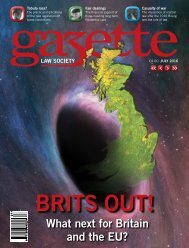ga ette
Jan-Feb-17-Gazette
Jan-Feb-17-Gazette
You also want an ePaper? Increase the reach of your titles
YUMPU automatically turns print PDFs into web optimized ePapers that Google loves.
EMPLOYEE VETTING<br />
Law Society Gaz<strong>ette</strong> | <strong>ga</strong>z<strong>ette</strong>.ie Jan/Feb 2017 41<br />
PIC: REX FEATURES<br />
THE ACT TAKES RELEASING SOMEONE’S<br />
PERSONAL INFORMATION VERY SERIOUSLY –<br />
NOT JUST ANYONE CAN APPLY<br />
personal relations where work is done for<br />
free. These vetting requirements also do not<br />
apply to employment that be<strong>ga</strong>n before 29<br />
April 2016, although there is the possibility of<br />
retrospective vetting under section 21 of the<br />
act and re-vetting under section 20.<br />
The chief bureau officer is required to<br />
create and maintain a register of relevant<br />
or<strong>ga</strong>nisations. Relevant or<strong>ga</strong>nisations are<br />
required to apply to be on this register and to<br />
give their names, addresses, and other relevant<br />
information. The act takes releasing someone’s<br />
personal information very seriously – not<br />
just anyone can apply. It can only be relevant<br />
or<strong>ga</strong>nisations and, even with those, it is only<br />
the liaison person within that or<strong>ga</strong>nisation<br />
who can apply for the information and receive<br />
it. Once registered, the relevant or<strong>ga</strong>nisation<br />
will nominate a liaison person in writing. This<br />
is the person who will apply for and receive<br />
vetting disclosures.<br />
The formalities for an application for<br />
vetting disclosure are found in section 13 of<br />
the act. An application for vetting disclosure<br />
shall identify the relevant work or activity<br />
to which the application relates, and the<br />
personal information of the person to whom<br />
it relates. Relevant or<strong>ga</strong>nisations can apply<br />
for vetting on behalf of other or<strong>ga</strong>nisations<br />
they represent. One area that is particularly<br />
sensitive is ‘specified information’ – this means<br />
information concerning a finding or alle<strong>ga</strong>tion<br />
of harm to another person that is received by<br />
the vetting bureau from the <strong>ga</strong>rdaí or from<br />
bodies such as the HSE, the Teaching Council<br />
or the Medical Council.<br />
Once the bureau receives the application<br />
for vetting disclosure, it will make enquiries<br />
with the <strong>ga</strong>rdaí to establish whether or not<br />
there is a criminal record and examine its<br />
databases to see if it contains particulars<br />
of any record of, or specified information<br />
relating to, the person concerned. The<br />
standard is higher where it relates to<br />
specified information, as this is not a<br />
conviction. Here, the act has to balance<br />
the presumption of innocence with<br />
protecting children and the vulnerable.<br />
Where a bureau staff member considers there<br />
is specified information relating to a person<br />
who is the subject of an application, they will<br />
refer matters to the chief bureau officer to see<br />
if it should be disclosed. If this occurs, the chief<br />
bureau officer will notify the person being<br />
v<strong>ette</strong>d in writing and let them know of the<br />
information and allow them to make written<br />
submissions about it. The chief bureau officer



